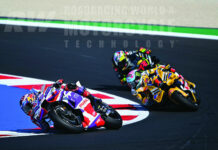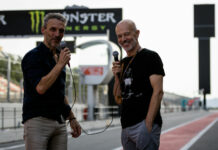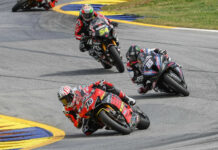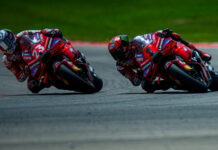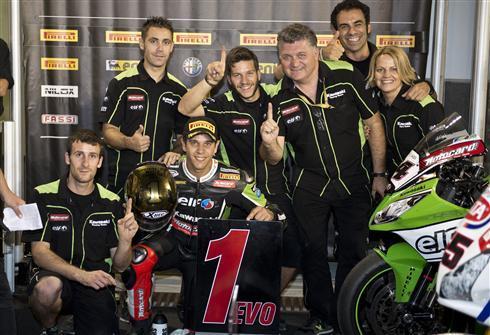Kawasaki’s 2014 Evo Campaign: How To Win First Time Out
As witnessed recently in Qatar, the KRT SB Evo team and rider David Salom proved victorious in the Evo series, which was run as an integral part of the overall World Superbike category in 2014. How this tough feat was managed despite some bad luck before the season had fully got into its stride is testimony to the abilities of the Ninja ZX-10R, David and all the personnel involved.
The 2014 FIM Superbike Word Championship was unique in many ways but the most obvious departure from the norm was the adoption of split technical rules. Teams could either be full SBK entries, with relatively liberal tuning and freedom of machine modification, or the all-new Evo category. Evo machines featured largely the same chassis rules as SBK, but used lower power Superstock engines and less advanced electronics by comparison.
Evo, as we now know, was a very successful yet one-time deal, as the class reunifies into one in 2015. It is significant therefore that Kawasaki and Salom were the Evo champions in face of tough competition from competitor machines with a higher degree of rider aids and heftier showroom price tags.
Kawasaki won the Evo category with fabulous record of 13 individual race wins and a final championship advantage of 30 points. It was not all plain sailing for KRT’s one man Evo squad, however.
Salom injured his hand in testing at Jerez early in the year, but it ended with mission accomplished on many fronts, according to KRT team manager Guim Roda,
“The main factor in winning a title is always the rider,” said Roda after the end of a tough but triumphant year. “I think David made a very good job and he understood the philosophy of the Evo class because it was important to not make mistakes. You could not gain 25 points for winning the Evo race, you had to play with four, five six, seven maximum.
“That meant that the difference between winning – and taking second or third – was just one, two or three points. If you made a mistake and lost a race then it would be very difficult to recover. We analysed the championship before the start of the season and realised that it would be better to make a ‘bad’ race and take only three or four points than make any mistakes from the front and lose or crash out. We understood this clearly and it was a key point to follow.”
Roda also thinks that some unexpected full SBK track time for Salom the season before was a big help to him, not to mention an early focus from Kawasaki on the Evo class, as well as the full SBK category.
“The other key point for David was that because Loris Baz (full SBK KRT rider in 2013 and 2014) was injured last year David was able to ride the full Superbike at Laguna Seca and Magny-Cours,” said Roda. “This gave him a good starting point on the Evo bike in the winter tests and immediately we started with the Evo bike. This was earlier than some other riders and factories on this project, which I think was a small advantage.”
After KHI had decided to go ahead with the Evo project, then provided the guidelines and tools to make it a reality, the KRT squad got to work in the workshop and at the tracks, as Roda explains. “One of the key points was also to choose the right people to manage the Evo project. As it was a one-year idea David’s crew chief Toni Alfosea and lead mechanic Cedric Veron, plus the other mechanics had to learn to make the most of the new Evo class really quickly.
“They were clever and understood the project very well. All the technical staff and personnel from KRT also gave their time freely to build up the project quickly, in particular Danilo Casonato, Pere Riba and Paolo Marchetti. It was a successful effort from everyone involved – KHI, KRT, the rider – everybody did a really good job.”
With new changes to the rules coming in 2015 as well, the team had to try to win Evo races and take a step into the future of the new look SBK class in 2015 at the same time.
For Salom it was a year when he had to show a high degree of grit and determination to overcome his painful right hand injury. “It was a difficult year because in early testing I broke my hand and it was very swollen, but at the end the championship was ours,” said Salom. “We started winter testing not knowing where we could finish in the championship but we worked very hard in the closed season to make a good bike.
“We went to the first round in Australia and won two races. It was incredible because I did not expect this. I had problems all year with my injured hand, but we rode fast in all the races and at the end we had a very good bike and won 13 races from 24,” said Salom.
As has recently been announced, Kawasaki is making good use of its 2014 Evo success by taking David, some of his technical crew, official technology and know-how into the Team Pedercini Kawasaki squad for 2015, to enhance the overall Ninja ZX-10R challenge. In other words, the 2014 Evo success proved to be one that just keeps on giving.


